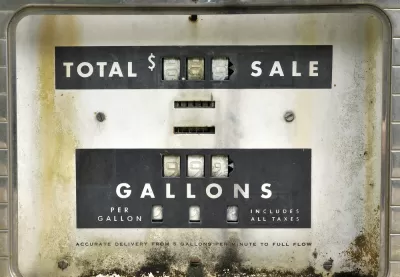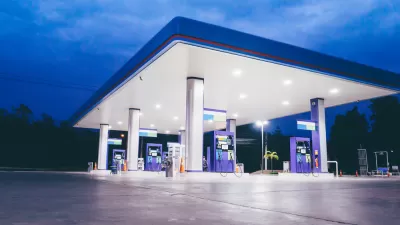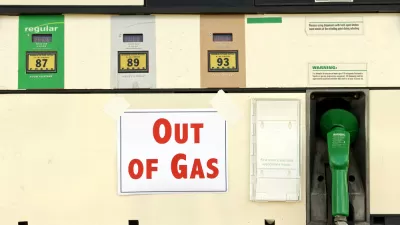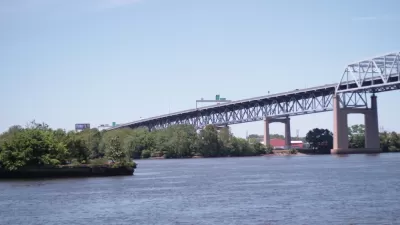Surprisingly, legislators are rewarded for supporting new gas taxes: they get reelected, according to a new analysis by the American Road and Transportation Builders Association. What's more, they overwhelmingly hail from red states.

Infrastructure in the Unites States was rated D+ in the American Society of Civil Engineers' 2013 report card, with roads rated D, bridges C, rail C+, and transit D. The major state source of transportation funding remains the tried and true gas tax, despite talk of alternative revenue sources.
"Twenty-one states have gone a decade or more without an increase in their gas tax rate," according to a June 28, 2016 analysis by the Institute on Taxation and Economic Policy.
Legislators are generally reluctant to increase taxes. Furthermore, many have signed a pledge by the Americans for Tax Reform and are reluctant to break it for fear of being 'primaried,' so this new analysis on how those who supported increasing state gas taxes fared in their primaries is highly relevant to any legislator faced with a vote to raise the gas tax who plans to run for reelection.
"Almost all lawmakers who supported legislation to raise their state’s gasoline tax last year won their primaries in 2016, according to an analysis from the American Road and Transportation Builders Association (ARTBA)," writes Melanie Zanona, transportation reporter for The Hill. The analysis was based on legislators from eight states.
Iowa, South Dakota, Utah, Idaho, Georgia, Nebraska, Washington, and Michigan all passed a fuel tax increase or something similar in 2015. Ninety-eight percent of the lawmakers who backed those increases and were up for re-election came out victorious in primary races this year, according to ARTBA’s Transportation Investment Advocacy Center.
Presumably the greatest threat to these leaders' reelection came in the primary. ARTBA may want to do a follow-up analysis after November 8, along with an analysis of governors who signed the gas tax increase legislation.
A complete list of the 11 states whose legislatures voted last year to either increase or stem the reduction of the gas tax was included in a Sept. 6 post on states awarded federal grants "to transition from the gas tax to other user-based revenue mechanisms":
- Alaska (Ind.): .95 cents (small but monumental as it was the first increase in 45 years) [Not included in ARTBA analysis]
- Georgia (R): About 8 cents, a result of conversion from fuel sales tax to an excise tax.
- Idaho (R): 7 cents
- Iowa (R): 10 cents
- Kentucky (D): An "effective increase" because it stopped the decrease. [Not included in ARTBA analysis]
- Nebraska (R): 6 cents.
- Michigan (R): 7.3 cents
- North Carolina (R): Like Kentucky, the legislature 'adjusted' its gas tax to prevent deeper reductions. While the tax did drop one cent on July 1, it is expected to begin increasing next year, "at an average of 2.3% a year." [Not included in ARTBA analysis]
- South Dakota (R): 6 cents
- Utah (R): 5 cents
- Washington (D): 11.9 cents
"Six of those [eight] states had a Republican governor and GOP-led legislature when the legislation was approved," adds Zanona [italics added]. The above list only includes the party of the governor.
The most determined legislators to increase the state gas tax were from Nebraska. The unicameral, nonpartisan legislature had to override the veto of first-term Republican Gov. Pete Ricketts who is eligible for reelection in 2018.
Here's the total breakout by party among the legislators from these eights states who voted for increasing the gas tax:
- Democrats: 122 of the 125 them succeeded in their primary races. [98%]
- Republicans: 287 of the 293 GOP won their primary seat. [98%]
Could survey findings apply on a federal level?
The 18.4 cent federal gas tax hasn't been increased since 1993, similar to many states. But don't expect Congress to be inspired by the analysis.
Members of Congress have struggled to come up with long-term funding solutions for the fund, and lawmakers from both sides of the aisle have been generally eager to avoid a vote on increasing the gasoline tax.
That's not to say they haven't tried. Representatives and Senators from both parties have tried to increase the federal gas tax.
A national gas tax hike is likely a tougher sell than state fuel tax increases, even with low gas prices. Taxpayers at the local level may have an easier time envisioning where their state or city tax increase is going when they can physically see a bridge or highway being built.
If there's a message in the 98 percent figure, it's to inspire confidence in state legislators who are wary of voting to increase gas taxes, yet want more funds for transportation to improve infrastructure.
For more information, see ARBTA press release and analysis, "2016 Primary Results Confirm Gas Tax Increase Vote Not Politically Toxic" [PDF].
Hat tip to AASHTO Daily Transportation Update, Sept. 7.
FULL STORY: Most state lawmakers who backed gas tax hike won their primaries

Trump Administration Could Effectively End Housing Voucher Program
Federal officials are eyeing major cuts to the Section 8 program that helps millions of low-income households pay rent.

Planetizen Federal Action Tracker
A weekly monitor of how Trump’s orders and actions are impacting planners and planning in America.

Ken Jennings Launches Transit Web Series
The Jeopardy champ wants you to ride public transit.

Driving Equity and Clean Air: California Invests in Greener School Transportation
California has awarded $500 million to fund 1,000 zero-emission school buses and chargers for educational agencies as part of its effort to reduce pollution, improve student health, and accelerate the transition to clean transportation.

Congress Moves to End Reconnecting Communities and Related Grants
The House Transportation and Infrastructure Committee moved to rescind funding for the Neighborhood Equity and Access program, which funds highway removals, freeway caps, transit projects, pedestrian infrastructure, and more.

From Throughway to Public Space: Taking Back the American Street
How the Covid-19 pandemic taught us new ways to reclaim city streets from cars.
Urban Design for Planners 1: Software Tools
This six-course series explores essential urban design concepts using open source software and equips planners with the tools they need to participate fully in the urban design process.
Planning for Universal Design
Learn the tools for implementing Universal Design in planning regulations.
Heyer Gruel & Associates PA
Ada County Highway District
Institute for Housing and Urban Development Studies (IHS)
City of Grandview
Harvard GSD Executive Education
Toledo-Lucas County Plan Commissions
Salt Lake City
NYU Wagner Graduate School of Public Service





























